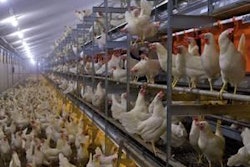Rothamsted Research is one of the largest agricultural research institutes in the UK and, as of April 15th, it has a new director and chief executive officer, Professor Maurice Maloney.
The appointment by the BBSRC, the UK funding agency for research in the life sciences, has brought a mixed response.
BBSRC’s chief executive Professor Douglas Kell commented that Professor Maloney brought a unique combination of skills and experience combining top class plant cell science with effective translation of research into successful business activity.
Peter Riley, of interest group GM Freeze, however, was less enthusiastic. He said: "The appointment of Professor Moloney to this important post suggests that the BBRSC is pushing on with the strategy of putting GM and biotechnology at the forefront of agricultural research. This would be a mistake as GM technology is expensive, unproven and risky.”
At least Professor Moloney’s appointment has not gone unnoticed.
For those unfamiliar with Rothamsted, it was established over 160 years ago, and is probably the oldest agricultural research centre in the world and, according to Professor Moloney, is “one of the most powerful engines for agricultural research in the world”.
For those not familiar with Professor Moloney, he founded the company SemBioSys Genetics Inc, based in Calgary, Canada, and has a successful academic career. Before moving to Calgary, he led the cell biology group at Calgene Inc, developing the world’s first transgenic oilseeds, resulting in RoundUp Ready Canola and other novel crops.
Commenting on his appointment, Professor Maloney said: “It will be a great privilege to lead further scientific developments at the institute and to deploy its science in meeting the challenges of sustainable food supply, bio-based energy and mitigation of agriculture’s carbon footprint for the benefit of both the UK and global agriculture.”
Good news bad news
The appointment comes at a period when the spotlight is again falling on GM in the UK.
In January, the country’s chief scientific adviser Sir John Beddington claimed that there was a need for a “new and greener revolution” to increase food production. He urged that genetic modification of crops and nanotechnology needed to be mobilized if catastrophic food shortages were to be avoided in the face of rising temperatures and global population.
Of course, his views have not been universally welcomed. In response to Professor Beddington’s calls, Emma Hockridge, Soil Association policy manager, said: “GM is not going to feed a growing population sustainably, now or in the future. We need far reaching changes to our food and farming systems, rather than GM technology, which, despite millions in public and private research expenditure has consistently failed to deliver food security.”
A series of reports into consumer attitudes to GM in the UK are due over the coming months and they will make interesting reading. All sides in the debate know that educating consumers is all important.
Later this year, “Innovation Farm” in Cambridgeshire is expected to start operations and will grow new breeds of wheat and potatoes. Lydia Smith of the National Institute of Agricultural Botany says that GM crops could be planted on the farm as they are developed so that farmers, the media and members of the public can see the results.
In unveiling the government’s food strategy, Food 2030, earlier this year, Secretary of State for Environment, Food and Rural Affairs Hilary Benn said: “We need to produce more food. We need to do it more sustainably. And we need to make sure that what we eat safeguards our health.”
And science should be able to prove the last point one way or the other. Then comes the proper education.


















